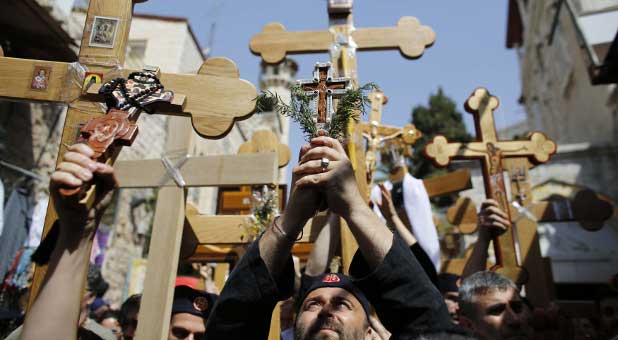A 2012 report by Israel’s Central Bureau of Statistics (CBS) reveals that Christianity is growing at a rate of 1.3 percent annually in the Holy Land. Clerics, however, recently expressed a concern about the life challenges faced by the Christian population there.
CBS reports that two percent of the country’s population—or 158,000 people—claim to be of the Christian faith. What may be surprising to many is that 80 percent of those are Arabs.
Officials from many denominations met earlier this week with international journalists in Jerusalem’s Old City to discuss the plight of Christians in Israel. Clerics are worried that Israeli Christians face an identity crisis among the general population, as well as major limitations when it comes to job opportunities and housing.
“We’re having some difficulties in defining ourselves in the Holy Land,” Father Pietro Felet of the Assembly of Catholic Ordinaries of the Holy Land told The Jerusalem Post. “We are not a national church, we are a mixture of Arab Christians, Hebrew-speaking Christians and Christians from the former Soviet Republic. About 45 percent are Catholic, 40 percent are Orthodox and 20 percent fall under the category of ‘other.’”
The CBS report indicates that the majority of Christian Arabs live in northern Israel, including 22,400 in Nazareth and 11,700 in Jerusalem.
Father Pierbattista Pizzaballa of St. Savior’s Monastery in Old Jerusalem says the Catholic Church has an 800-year presence in Israel, giving legitimacy to the sect. He noted that although the education level among Christians is high, many have had difficulties finding sustainable employment.
CBS reports the employment rate for Christians in Israel stood at 63.8 percent for men and 45.3 percent for women, compared to the national average of 75 percent and 66 percent, respectively. Among Christian Arabs, the number is 48 percent overall.
Pizzaballa says the church has built hundreds of housing units for Christians in the Old City’s Christian quarter, with projects planned in Jaffa and Nazareth. Fiscal limitations have prevented more being built.
“One of the problems for the Catholic Church in Jerusalem is land and housing, which is very expensive,” he told The Jerusalem Post. “To get more land that means money, but for a normal family, the prices are almost impossible [to afford].”
Pizzaballa says through recent negotiations between the church and the state, he is encouraged that the standard of living for Christians in Israel will improve soon.
Another issue that worries the church is hate crimes against Christians, including vandalism of holy sites. Israeli police and authorities have worked with the church to reduce the number of hate crimes, but Pizzaballa says they are still prevalent.
“If you don’t denounce these issues when they happen, they will continue. We need to work on this,” he says.
The church’s concern for the “alarming level of ignorance about Christianity in Israel” is very real. Lutheran World Federation President Bishop Munib A. Youman—a Palestinian—says the Hebrew media propagates the bias and denounced travel restrictions for Christians from Bethlehem and Ramallah to Jerusalem.
“When I read in the Hebrew about Christianity, I wonder if I’m Christian,” he told The Jerusalem Post. “One of the things we face as Christians are generalizations about us being persecuted in Palestine or Israel. There are issues between us and the governments, but please don’t say ‘persecution.’ Everybody wants to be in Jerusalem. Why can’t a person cross with dignity? This is not acceptable.”
Not to be confused with Christians, Maoz Israel reports there are approximately 15,000 Messianic Jews—Jews who have accepted Christ as their Savior—living in Israel. Challenges for that sect of the population are also numerous.














































